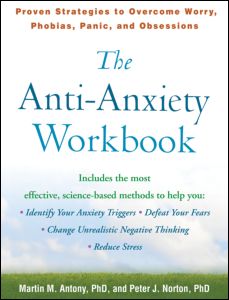Published: April 29, 2009
 Panic attacks. Phobias. Obsessive-compulsive behaviour. Six million Canadians cope with some form of anxiety – from mild to severe – everyday. The Anti-Anxiety Workbook, a new book co-authored by Ryerson University psychology professor Dr. Martin Antony and Dr. Peter Norton, director of the University of Houston Anxiety Disorder Clinic, suggests practical ways to overcome these often debilitating health conditions.
Panic attacks. Phobias. Obsessive-compulsive behaviour. Six million Canadians cope with some form of anxiety – from mild to severe – everyday. The Anti-Anxiety Workbook, a new book co-authored by Ryerson University psychology professor Dr. Martin Antony and Dr. Peter Norton, director of the University of Houston Anxiety Disorder Clinic, suggests practical ways to overcome these often debilitating health conditions.
“The book is very timely,” says Dr. Antony, who is also Ryerson’s psychology graduate program director and director of research at St. Joseph’s Healthcare’s Anxiety Treatment and Research Centre in Hamilton. He is also president-elect of the Canadian Psychological Association. [continue reading…]
Published: April 29, 2009
Thanks to the 24-hour media coverage about swine flu, we’re all aware that a potential flu pandemic could be nigh. But before you stock up on face masks and hand sanitizer, it’s important to put some things in perspective.
William Sutker, M.D., chief of infectious diseases at Baylor University Medical Center at Dallas says that first and foremost, we should remain calm.
“As of now, there is no need for people to panic. So far, there have been very few cases reported,” says Dr. Sutker. “At this point, it is unclear if the swine flu outbreak will develop in to a full blown pandemic.”
Although there are many myths and misconceptions floating around, Dr. Sutker says the facts about swine flu are these: [continue reading…]
Published: April 28, 2009

iPhone app my quitline
Smokers can turn to their iPhones to help them quit smoking with evidence-based treatment through a free app downloadable from iPhone or iTunes. The app links users to the National Cancer Institute’s quitline service where they speak to a live quitline coach or use live text to get advice on quitting.
“My QuitLine” was developed by the The George Washington University’s School of Public Health and Health Services (SPHHS) and the National Tobacco Cessation Collaborative (NTCC), with support from the National Cancer Institute (NCI). [continue reading…]
Published: April 28, 2009

Image credit: Wikemedia Commons
A research team has connected more of the intricate pieces of the autism puzzle, with two studies that identify genes with important contributions to the disorder. One study pinpoints a gene region that may account for as many as 15 percent of autism cases, while another study identifies missing or duplicated stretches of DNA along two crucial gene pathways. Significantly, both studies detected genes implicated in the development of brain circuitry in early childhood. [continue reading…]
 Panic attacks. Phobias. Obsessive-compulsive behaviour. Six million Canadians cope with some form of anxiety – from mild to severe – everyday. The Anti-Anxiety Workbook, a new book co-authored by Ryerson University psychology professor Dr. Martin Antony and Dr. Peter Norton, director of the University of Houston Anxiety Disorder Clinic, suggests practical ways to overcome these often debilitating health conditions.
Panic attacks. Phobias. Obsessive-compulsive behaviour. Six million Canadians cope with some form of anxiety – from mild to severe – everyday. The Anti-Anxiety Workbook, a new book co-authored by Ryerson University psychology professor Dr. Martin Antony and Dr. Peter Norton, director of the University of Houston Anxiety Disorder Clinic, suggests practical ways to overcome these often debilitating health conditions.

